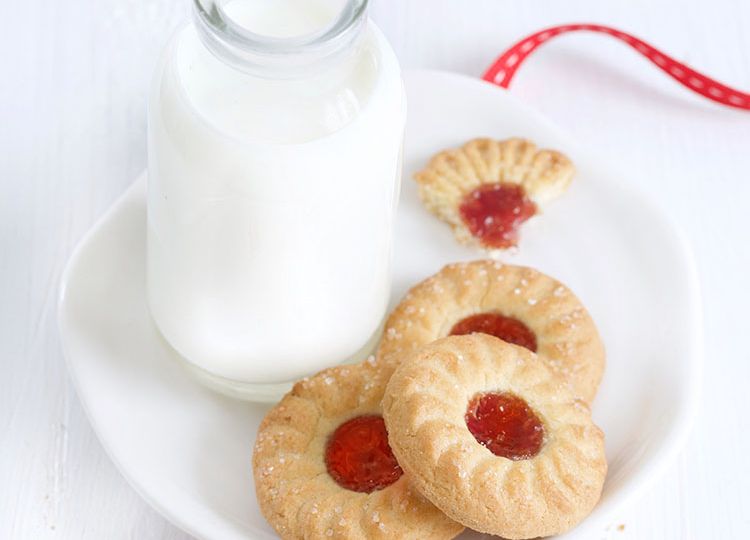
When Hans Freitag opened his bakery and pastry shop 74 years ago, he had no idea that two generations later his company would develop into one of the largest producers of private label cookies in Europe.

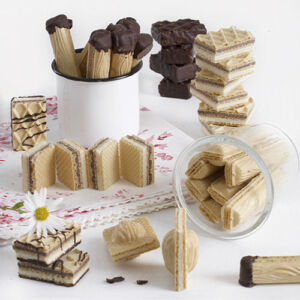
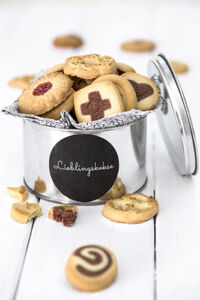
Classics in the cookie segment: Fruit tartlets (above) and the Mozart sticks (middle) created by company founder Hans Freitag. Below: For black and white baked goods, Hans Freitag uses a 6-head Rheon system
The production of cookie and wafer mixes is the business area in which the Verden cookie and wafer factory, Hans Freitag operates. The company is a trademark specialist and, when it comes to tonnage, is one of the big players in Germany and Europe with an annual production of 26,000 tons. It is all about the mixtures in the bags, which weigh 400 or 500 g as standard, contain six to eight types of cookies and are available on the market at prices sometimes below one EUR. It’s a low-margin business; quantities count.
“Our driver is the suitability for mass production.”
“Our driver is the suitability for mass production; the large batch sizes don’t chanage very much.” says Anita Freitag-Meyer, who has been managing the company, now in the 3rd family generation since 1991. “As a private label manufacturer, we pay attention to the mainstream. We are there for the classics in the cookie segment.” Classics such as the fruit tartlet (cookie filled with jam) or the Mozart stick (cream-filled hollow wafer, partly covered with chocolate), the latter developed by Anita’s grandfather and company founder Hans Freitag.
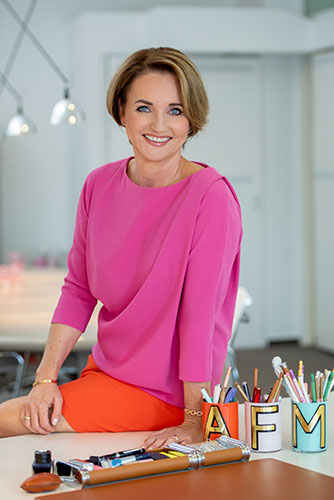
Managing Director Anita Freitag-Meyer
Verden cookie and wafer factory, Hans Freitag
+ Specializing in cookie and wafer blends
+ 35 types of molded, injection-
molded and cut cookies as well as wafer cookies
+ Sales 2019 (Verden plant): approx.: EUR 55 million
+ Share of private labels: 80 %
+ Export rate: 30 % (export to over 50 countries)
+ 27,000 qm production area
+ Max. daily production: 130 t cookies and wafers
+ 330 employees, 300 in production
Verdener Keks- und Waffelfabrik was founded in 1946, originally as a bakery and confectionery by Master Baker Hans Freitag. In 1948 the company moved to its present location. Since 1949, the company has concentrated exclusively on the production of cookies and wafers.
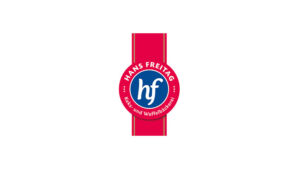
Growing trade
In the 2019 financial year, the company generated sales of around EUR 55 million, 80% of which was generated with private labels. The cookie manufacturer has grown with the retail trade. Early on, the company founder made contact with Edeka, and today Edeka still remains a very important customer. All the other large German retail groups and discounters are clients as well, including Hofer in Austria, Migros and Aldi in Switzerland and Mercadona in Spain. The export share is 30 %.
“We are very active in export,” reports the Managing Director. “This is where I see our greatest opportunities for growth. Today, we are represented in 50 countries worldwide and are strong in Italy, Austria, Switzerland and Scandinavia and even stronger in North America and Asia in terms of sales.” In Beijing today, there is barely a supermarket without Hans Freitag cookies. The company also has contacts in India: “Up to now, just as in China 20 years ago, India didn’t have packages with mixed cookies. We wanted to change that.” She explains that, “Pure veggie is important in India, and so whole egg powder cannot be used. Smaller units are also required, hence no 500-g bags. Large bags would overtax the neighborhood stores and the wallets of Indian customers. The previously strong Turkish business has broken away, although we now have a foothold in Brazil. A lot of business is also done abroad through our own brand ‘Hans Freitag’. Not every customer fits private label. That is why we have to bring our brand with us. Export is not easy, but worthwhile.”
With the online store, Hans Freitag has established a further sales channel. Money-wise, it plays a minor role, but it is important for other reasons. “We are very active on social media, seeking contact with end customers via Facebook and Instagram and we also have a Cookie Blog. When you communicate with the consumer, you have to provide a platform for the consumer where they can buy the products”.
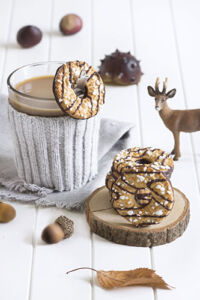
Three shift operation, five days a week
The production in Verden is divided into the bakery and the wafer department, with each section headed by a Master Baker. Everything is fully automated except for the dosing of small components such as flavors or salt. Approx. 300 employees in production work in three shifts, five days a week. In addition to Haas and Hebenstreit automatic wafer baking machines, five Werner & Pfleiderer and Meincke steel band ovens are used to bake shaped and wire-cut cookies.
The company also uses Ishida and MULTIPOND multiheaded weighing systems, a 6-head Rheon line for black and white cookies and a ROVEMA Form Fill and Seal machine for packaging.
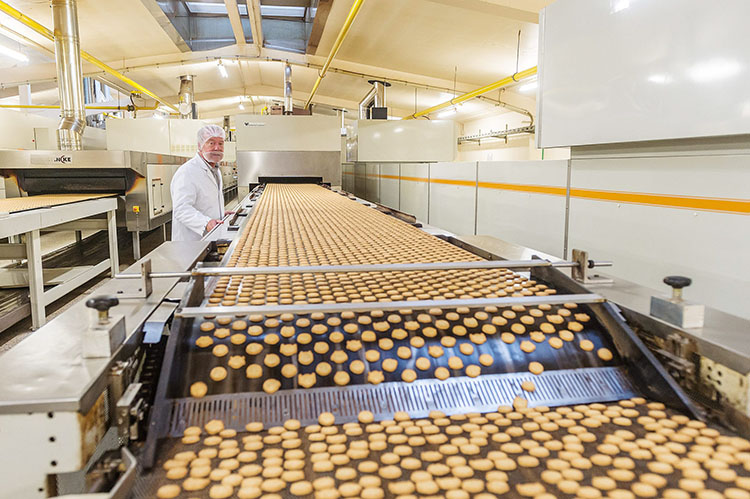

Trends and challenges
The baked goods market is continually looking for innovation. Even for a private label specialist, it is important to keep up with trend topics such as protein cookies, sugar reduction, a better nutritional profile in general, the use of hemp, turmeric or chickpea flour, products to-go and new weight units. “We don’t have the time to explore new areas and so we have a collaboration with Dr. Quendt. One of the latest developments is an organic hemp spelt cookie with chocolate chips”, reports Anita Freitag-Meyer.
The Managing Director sees one of the biggest challenges in the cookie market as people’s eating habits: “A cookie is a cookie and cannot become an apple. It will always remain a product of pleasure.” The fact that other market participants such as confectionery manufacturer Ferrero are pushing into the cookie market is also having an effect on the market. “The area we serve is not growing. That is why we have to keep working at it to ensure that the company is still sustainable in 10 years’ time.”

Second location
A second cookie factory has been part of the Hans Freitag Group since the summer of 2019. The factory is located about 50 km away and operates under the name ‘Heidekeks’. It also produces private label baked goods. It has approx. 180 employees and has almost the same amount of machinery as the main headquarters. In addition to cookies and wafers, seasonal baked goods such as gingerbread and pepper nuts are also produced.
Reducing film is a hot topic
Packaging is the consumer’s touch-point and packaging material reduction is a big issue for the cookie manufacturer from Verden. Mainly, packaging is done in bags made of OPP (oriented polypropylene) foils from the roll, and also, to a lesser extent, in cans (cardboard core, coated with aluminium inside). Anita Freitag-Meyer: “The trade demands savings of up to 30%. But because we pack in bags, not in blisters, our starting points are limited. We see possibilities in reducing the repeat and making the bag shorter. Savings of 10 µm on our 58 µm thick film are also conceivable. All in all, we will definitely end up with over 20 % less plastic”.
Private Label in Europe: a permanent feature in the supermarket
Private labels are an integral part of any supermarket range. According to a study conducted by Nielsen Market Research for the yearbook of the PLMA (Private Label Manufacturers Association), the market share of private labels in terms of volume is above the 30% mark in almost all of the 19 European countries considered. In Italy, it is “only” 22.3%. Switzerland has the highest share, 49.6%, which is mainly due to the dominance of the local Migros and Coop retail groups. Spain is not much lower, with a share of 49.5 %. The UK is in third place with 46.8 %, and Germany with 43.1 % and Austria with 42.2 % are mid table.


